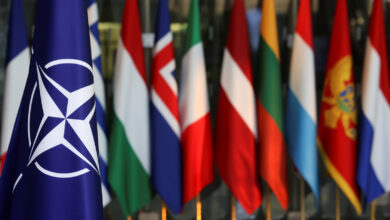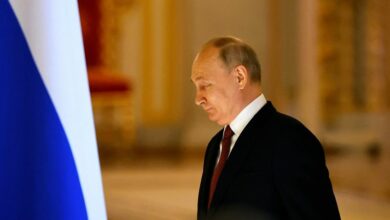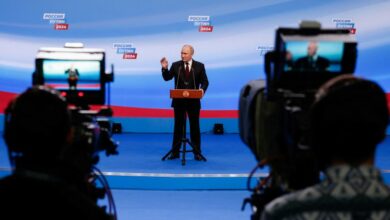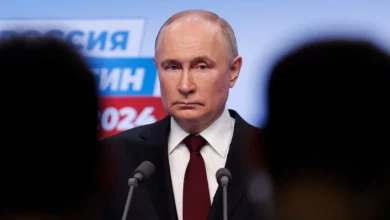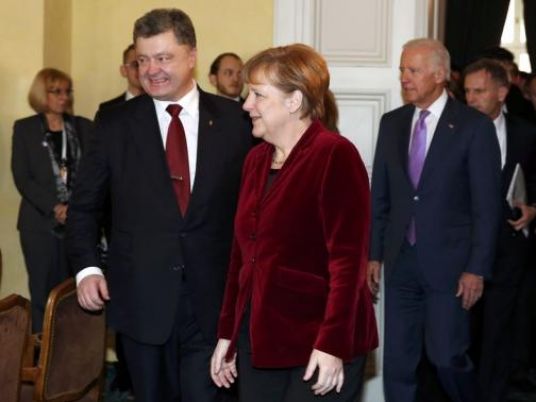
Ukraine said on Thursday there was no good news yet after 14 hours of tortuous talks between Kiev, Moscow, Berlin and France, as the Kremlin was posing "unacceptable conditions" on ending the 10-month conflict in the ex-Soviet country.
"Unfortunately there's no good news yet," Ukrainian President Petro Poroshenko told AFP in a break during the marathon four-way peace summit in Minsk. "There are conditions that I consider unacceptable" being posed by Russia, he said, declining to elaborate. "The (negotiations) process is ongoing."
Poroshenko, Russia's Vladimir Putin, France's Francois Hollande and German Chancellor Angela Merkel have been locked in talks at the presidential palace in Minsk since late Wednesday, trying to work out a plan to end a conflict that has pitted pro-Russian rebels against Kiev government forces in east Ukraine, killing at least 5,300 people and plunging East-West relations to a post Cold War low.
"There is always hope," said a tired Poroshenko. "We're in non-stop talks, as you can see, the situation is very difficult, Angela Merkel and President Francois Hollande are helping us a lot, but for now the situation is difficult."
Earlier, a diplomatic source told AFP there was hope that a contact group including representatives of Ukraine, Russia, the rebels and the Organization for Security and Cooperation in Europe (OSCE), which is meeting in parallel, could reach a deal on "concrete implementation" of a failed September peace deal.
One of the main sticking points of the failed September "protocol" is who controls the 400-km (250-mile) stretch of Russia's border with rebel-controlled Ukraine. Kiev accuses Moscow of pouring troops and weapons across the border to bolster the insurgency, charges the Kremlin denies.
There is also deep disagreement over the size of the territory the rebels will control, as they have made considerable gains in recent weeks.
In a sign of progress, separatist leaders Alexander Zakharchenko and Igor Plotnitsky joined the contact group talks, where they had previously been represented by lower-level rebels.
Arch-foes Poroshenko and Putin were meeting for the first time since October at the climax of a frantic European diplomatic drive aimed at stopping the worst East-West crisis since the end of the Cold War from escalating.
Underscoring the urgency, the number of those reported killed in the hours before the make-or-break talks rose to at least 49.
Yawning but still arguing
The French presidency said prior to the meeting in Minsk that Hollande and Merkel would "try everything right to the end" to try to get something from the last-ditch meeting.
The most pressing element is the need to agree an immediate ceasefire between the two sides that would see an end to the surging fighting that has killed hundreds of civilians in recent weeks.
A key sticking point is whether a new deal will extend rebel control over 500 square kilometres (200 square miles) of territory seized over the past month.
Moscow is also pushing for the separatist-held territories to be granted a large degree of autonomy, but Kiev only says that it is willing to decentralise some powers.
Poroshenko warned before the talks that he would introduce martial law throughout the country if they fail to stop the war.
Martial law would mark a significant escalation of the crisis, freeing up military resources for the fight in the east but also likely leading to the severance of foreign investment for cash-strapped Ukraine, including a vital IMF loan.
One voice
Poroshenko had said that he, Hollande and Merkel would speak "with one voice" to Putin, whom they accuse of backing the rebellion.
Poroshenko is scheduled to brief a European Union summit in Brussels on Thursday.
European Union foreign policy chief Federica Mogherini said the talks would be a "turning point for good or bad", while Russia voiced optimism.
If the Minsk talks fail, US President Barack Obama has warned that Washington may decide to start providing lethal weapons to Ukraine, a step many European leaders oppose for fear of getting drawn into open conflict with Russia.
The bloodletting in eastern Ukraine has been relentless in recent weeks as the rebels have pushed deeper into government-held territory and Kiev forces have counter-attacked.
As the leaders converged on Minsk, fighting raged on the ground with both sides trying to strengthen their hand at the negotiating table.
Insurgents have been battling for weeks to take the rail hub of Debaltseve, while Ukrainian forces on Tuesday captured ground around the port city of Mariupol.

